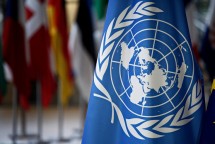Regional Thought Leaders Shared Insights on The Future of Clean Mobility in Southeast Asia at Future Mobility Asia Event Preview
By : Nata Kesuma | Wednesday, April 06 2022 - 17:10 IWST

Future Mobility Asia (FMA) 2022, an integrated global exhibition and conference with extensive display of solutions and concepts, slated for 20 to 22 July, at the Bangkok International Trade and Exhibition Centre (BITEC)
INDUSTRY.co.id - SINGAPORE, April 6th, 2022 - Future Mobility Asia (FMA) 2022, an integrated global exhibition and conference with extensive display of solutions and concepts, slated for 20 to 22 July, at the Bangkok International Trade and Exhibition Centre (BITEC), presented an Event Preview with in-person participation on March 30, 2022, at Bangkok Marriot, Marquis Queen’s Park.
As the first of its kind in Asia dedicated to clean mobility, industry experts across Southeast Asia converged at the Event Preview to share in-depth insights on the promise of clean mobility, address business challenges in the mobility sector, and to define and refine the FMA 2022 conference program.
The Event Preview was preceded with a hybrid media briefing with local Thai media and virtual attendance from international media.
"The switch to clean mobility could potentially extend the region beyond its environmental benefits. The clean mobility revolution is creating an opportunity for Southeast Asia to leapfrog its position in the automotive value chain and subsequently drive economic competitiveness and job creation. In the post-pandemic juncture, a strong economic impetus is needed and encouragingly, Southeast Asia has risen to the occasion," said Mel Lanvers-Shah, Vice President Asia, dmg events.
Hybrid Media Briefing
On March 30, 2022, Thai media attended an in-person briefing at 2 pm (GMT+7) where business challenges in Thailand to move towards a clean and autonomous mobility transformation were discussed, with international media attending virtually.
Dr. Twarath Sutabutr, Chief Inspector General, Thailand Ministry of Energy & Co-chair of Future Mobility Asia Steering Committee; Chanin Khaochan, Deputy Secretary General, Thailand Board of Investment; Trung Nguyen, General Manager – South East Asia, SEA Electric; Josephine Ong, Managing Director, Asia Pacific South, Dassault Systèmes, and Nicole Wu, CEO & Director, EVLOMO participated in the media briefing to answer questions on the landscape of Thailand's charging infrastructure and the country's plans as Thailand move towards their commitment on electric vehicles.
"Thailand is certainly going towards clean mobility with plans to implement home charging stations and public charging stations at hotels, department stores and tourist destinations. The government is certainly supportive of clean mobility and we foresee proactive plans and policies to be rolling out in the near future to support the charging infrastructure in Thailand," said Dr. Twarath Sutabutr, Chief Inspector General, Thailand Ministry of Energy & Co-chair of Future Mobility Asia Steering Committee.
Event Preview
At the FMA 2022 Event Preview held at 4 pm (GMT+7), industry practitioners were invited to present concrete and actionable case studies of successful implementations. The Event Preview featured two panel discussions where senior representatives of the Thai government and industry leaders provide insights to the ASEAN clean mobility ambition and the Thailand 3030 electric vehicle production policy.
Matthew Rowe, Director, Power Grids, Asia – Pacific, DNV opens the first panel discussion by sharing statistics on the energy transition outlook. DNV predicts a 50 per cent increase in passenger vehicles on the road globally by 2050. Despite a growth in car sharing and semi-automated car driving, the global car fleet may expand by 60 per cent.
Following the presentation of statistics of electric vehicles, key solutions players were invited to discuss the role of each city and how ASEAN can jumpstart the clean mobility ambition.
"At SEA Electric, we understand that electric mobility is not a cheap investment hence, we have to work closely with policy makers. Countries across Southeast Asia are rolling out incentives to support businesses in enhancing the future of clean mobility. While we face endless barriers and obstacles from end-users, the government will be of great help to address these concerns. Our participation at Future Mobility Asia happening in July is opening up opportunities for us to share experiences with global industry leaders," said Trung Nguyen, General Manager – South East Asia, SEA Electric.
"A thorough understanding of each city is important because the local environment differs by countries and cities. We have to understand the three main topics; environment, economy and the balance between incentives and infrastructure. Taking Singapore as an example, the nation knows that 15 per cent of its land is used for car transportation, hence rolled out a car-lite program with a goal of moving towards a sustainable environment. Cities will play a critical role to define their economy and implement the best measures, considering the environmental impacts," said Guillaume Gerondeau, Vice President, Senior Director, Transportation & Mobility Industry Asia, Dassault Systemes.
Leading the region with initiatives such as the 3030 EV production policy, Thailand aims to transform 30 per cent of the total automotive production to electric vehicles by 2030. The second panel discussion was conducted by representatives from the Thai government and Thai experts to discuss Thailand's plans in becoming a production hub for clean mobility in Southeast Asia.
"By 2030, Thailand aims to produce 725,000 electric vehicles with plans to penetrate global markets. We are expecting 400,000 units to be sold in domestic markets while the others will be on exports," said Chanin Khaochan, Deputy Secretary General, Thailand Board of Investment.
The panel discussion further emphasised Thailand's ambition in high production of electric vehicles while ensuring that existing internal combustion engine (ICE) vehicles maintain as the country progresses. The panelists shared their concerns and the challenges foreseen as Thailand adopts clean mobility.
"One of the biggest challenges in adopting electric vehicles is the need for charging infrastructure. Public charging is one of the key factors to ensure that end-users can travel freely with no constraints, similar to how end-users travel with ICE vehicles. People may rely on public charging facilities due to the absent of home charging facilities. In this case, the government's support and investments on the implementation of charging stations across Bangkok is important," said Yossapong Laoonual, Assistant to President for Sustainability, King Mongkut’s University of Technology Thonburi, Honorary Chairman, EVAT.
Read Also
Cipta Perdana Lancar Ready to Expand and Diversify for Sustainable…
Electric Cars are Indonesian Automotive Industry’s Future, President…
Minister of Industry Agus Optimistic 2024 Indonesia's Manufacturing…
Manufacturing Still Accounts for Lion’s Share of Exports: Industry…
DRMA Again Records Increase in Net Profit Up to Double Compared to…
Today's Industry

Rabu, 22 Januari 2025 - 12:53 WIB
MICE Activities at JCC Halted, PT GSP Continues Legal Process
PT Graha Sidang Pratama (PT GSP), the investor and manager of the Jakarta Convention Center (JCC), revealed that the company is currently unable to run Meeting, Incentive, Convention and Exhibition…

Sabtu, 14 September 2024 - 16:56 WIB
Essential Tips for Choosing Personal Health Insurance in the US
Choosing the right health insurance plan in the United States can be a complex task, especially with the variety of options available and the ever-changing landscape of healthcare policy. Here…

Sabtu, 14 September 2024 - 16:53 WIB
The Top 10 Insurance Companies in the US for 2024
In the ever-evolving landscape of insurance, selecting the right company can significantly impact your financial security and peace of mind.

Jumat, 13 September 2024 - 15:37 WIB
Why Airbnb Become Popular in 2024?
Airbnb fosters a more interactive experience between hosts and guests. Through direct messaging, guests can inquire about specific details, negotiate pricing, or clarify expectations, which…

Kamis, 15 Agustus 2024 - 14:26 WIB
Modena Officially Becomes a Member of the UN Global Compact
Commited to transforming towards sustainable business practices, Modena the global home appliance established over 60 years ago in Italy, officially became a member of the UN Globe Compact (UNGC)…

















News Comment